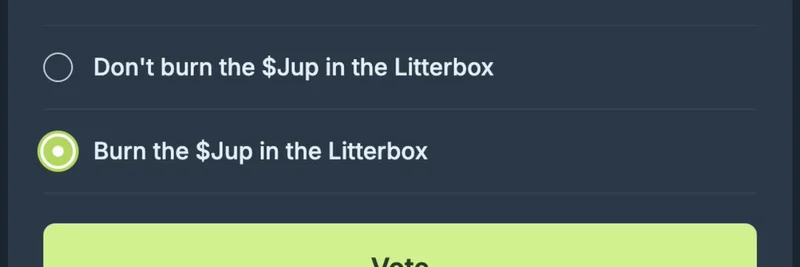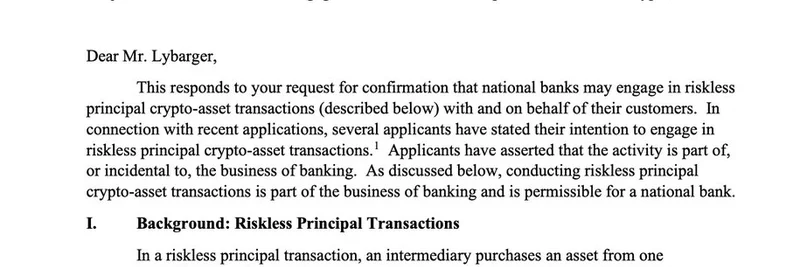In the fast-paced world of Solana DeFi, Jupiter—a leading DEX aggregator—has sparked a heated debate with its latest DAO proposal. The question on everyone's mind: Should the community burn the $JUP tokens sitting in the Litterbox? A recent thread from DeFi enthusiast @FabianoSolana breaks down why he's voting yes, and it's got the community buzzing. Let's unpack this and see what it means for $JUP holders and the broader ecosystem.
What Is the Jupiter Litterbox and Why Burn It?
First off, a quick explainer: Jupiter operates on Solana and handles massive trading volumes through its aggregator. Half of its onchain revenue flows into the "Litterbox" trust, which uses those funds to buy back $JUP tokens. Right now, that pot holds over 120 million $JUP—roughly 4% of the total supply, valued at around $53 million.
The proposal, live on the Jupiter voting platform, asks whether to burn these tokens permanently or keep them for future use, like incentives. Burning means removing them from circulation, which could tighten supply and potentially boost the token's value over time. The vote runs from October 29 to November 4, 2025, and it's a big deal for governance in DeFi.
FabianoSolana's Case for Burning: A Bet Against Uncertainty
In his thread, FabianoSolana shares his vote to burn and lays out three key reasons. He starts by calling it a "bet against uncertainty." Crypto thrives on momentum, but DAOs can sometimes bog things down with endless debates. Keeping the Litterbox intact might lead to more arguments about how to use it, stalling progress. Burning it simplifies things and refocuses the team on building.
He points out that Jupiter has already raked in this amount quickly, and if Solana keeps growing, they could easily replace it. Not burning would just prolong the uncertainty that's already a drag on prices.
Rethinking Incentives: Why Paying in $JUP Might Backfire
Next, Fabiano tackles the idea of using the Litterbox for staking rewards. He calls it one of the "stupidest" moves a project can make—staking $JUP to earn more $JUP, which stakers often sell right away. This creates a sell-pressure loop that only works in bull markets. Jupiter has dished out plenty of incentives already through programs like ASR (Active Staking Rewards) and Jupuary airdrops.
Instead, he hints at better staking models down the line, especially with Jupiter's expanding product lineup. Why rush into token rewards when revenue-sharing in stablecoins like USDC could align incentives without dumping pressure?
The Power of Consistent Burns: Lessons from BNB
Finally, Fabiano addresses skeptics who say a 4% burn won't move the needle. He agrees it might not spike the price overnight—effects are often psychological or short-term. But it's a solid start. He nods to Binance's BNB as a model: quarterly burns that ramp up when prices dip, creating a strategic deflationary mechanism.
Fabiano wraps up by suggesting this shouldn't be a one-off. He'd love another vote on long-term strategy to make burns consistent and effective.
Community Reactions: Mixed Views on the Burn
The thread drew quick responses. @Borks55 agrees, slamming anti-burn arguments as just folks wanting "quarterly paychecks" to dump. @derparsel voted no, arguing 4% isn't game-changing and the tokens are safely locked anyway—no real uncertainty. @DrCryptoStrange floats revenue-sharing in USDC as a win-win for stakers, encouraging more staking and ecosystem growth.
Others like @Kokolowo2 weigh the pros: Burning favors holders via price action, while rewards might lead to sells that tank the token.
What This Means for $JUP and Solana Meme Tokens
This vote isn't just about $JUP—it's a snapshot of how DeFi projects are evolving tokenomics. Burning could signal maturity, reducing supply overhang and building holder confidence. For meme token enthusiasts on Solana, it's a reminder that governance matters. Projects like Jupiter blend utility with community-driven decisions, setting them apart from pure memes.
If the burn passes, watch for follow-up proposals on sustainable models. Jupiter's already tweaking things, like shortening $JUP redemption periods to boost liquidity. Stay tuned—Solana's DeFi scene is heating up, and moves like this could ripple across the chain.
For more on the proposal, check the official discussion. What do you think—burn or hold?




